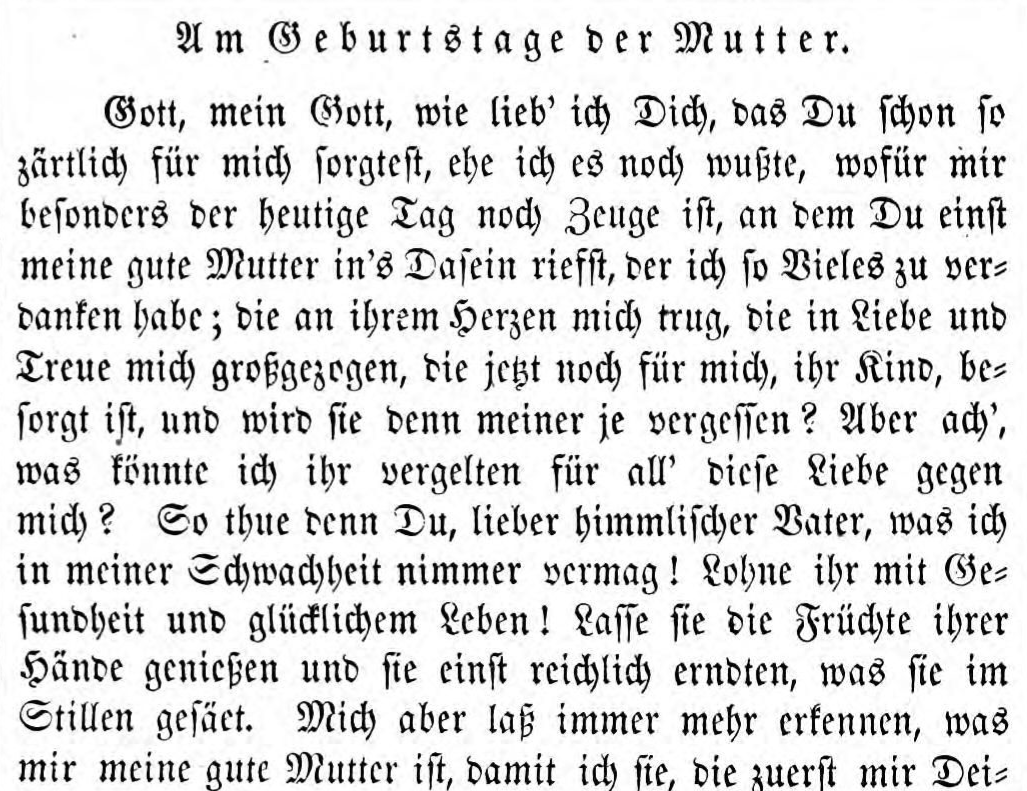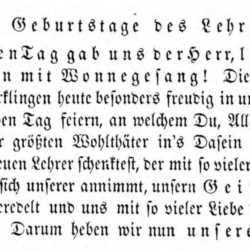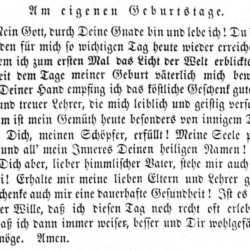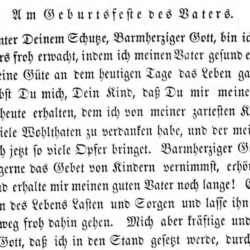| Source (German) | Translation (English) |
|---|---|
Am Geburtstage der Mutter. |
On one’s mother’s birthday. |
Gott, mein Gott, wie lieb’ ich Dich, das Du schon so zärtlich für mich sorgtest, ehe ich es noch wußte, wofür mir besonders der heutige Tag noch Zeuge ist, an dem Du einst meine gute Mutter in’s Dasein riefft, der ich so Vieles zu verdanken habe; die an ihrem Herzen mich trug, die in Liebe und Treue mich großgezogen, die jetzt noch für mich, ihr Kind, besorgt ist, und wird sie denn meiner je vergessen? |
God, my God, how I love you, that you cared for me so tenderly even before I knew it, for which today in particular is still a witness, on which you once brought my good mother into existence, to whom I owe so much; who carried me in her heart, who raised me in love and faithfulness, who now still cares for me, her child, and will she ever forget me? |
Aber ach’, was könnte ich ihr vergelten für all’ diese Liebe gegen mich? |
But ah, what could I repay her for all this love for me? |
So thue denn Du, lieber himmlischer Vater, was ich in meiner Schwachheit nimmer vermag! Lohne ihr mit Gesundheit und glücklichem Leben! Lasse sie die Früchte ihrer Hände genießen und sie einst reichlich erndten, was sie im Stillen gesäet. |
So then, dear heavenly Father, do what I can never do in my weakness! Reward her with health and a happy life! Let her enjoy the fruits of her hands, and let her one day abundantly reap what she has silently sown. |
Mich aber laß immer mehr erkennen, was mir meine gute Mutter ist, damit ich sie, die zuerst mir Deinen heiligen Namen genannt, durch einen frommen Wandel in Deinen Wegen ehre, und ihr alles Liebe und Gute erweise, so lange sie lebet. Dazu mögest Du mir verhelfen, mein Gott und Vater! Amen. |
But let me recognize more and more what my good mother is to me, so that I may honor her — who first taught me your holy name — by walking piously in your ways, and by showing her all lovely and good things as long as she lives. May you help me to do this, my God and Father! Amen. |
“[Gebete] Am Geburtstage der Mutter” was written by Rabbi Benjamin Szold and included in his הגיון לב Israelitisches Gebetbuch für die häusliche Andacht (1867), page 252.
We welcome corrections and improvements. The transcription of the German from Latin script in Fraktur type provided machine-readable text for a machine translation by DeepL, which we then edited for accuracy and clarity. –Aharon Varady
Source(s)


“Am Geburtstage der Mutter | On one’s Mother’s Birthday, by Rabbi Benjamin Szold (1867)” is shared through the Open Siddur Project with a Creative Commons Attribution-ShareAlike 4.0 International copyleft license.










Leave a Reply